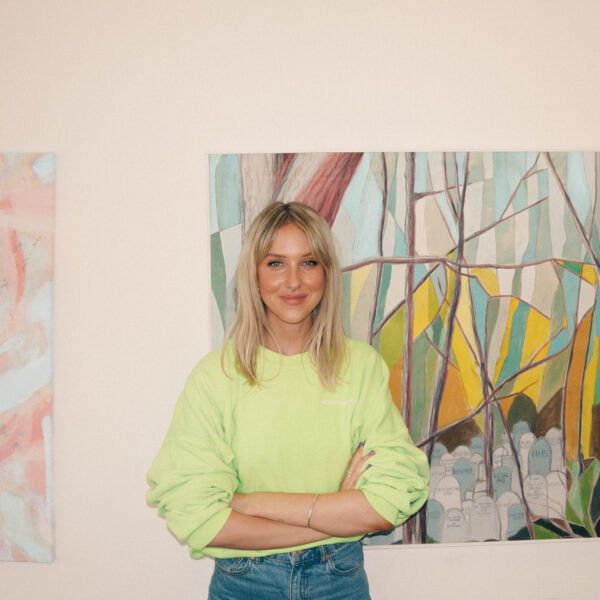
Natasha Collie
Senior Brand Marketing Manager at Penguin Random House UK
At the start of the year, Ladybird Books approached Sonder & Tell with a dream brief. In 2021, a year that’s been particularly challenging for...
In conversation with
Model & Journalist

When Simran Randhawa first came across gal-dem it was just a Facebook group at the University of Bristol. In a predominantly white, middle class and unrepresentative community, “baby gal-dem” was where around 30 other women of colour could “vent in a group chat and everyone would help.” Simran went on to write her dissertation on the experience of women of colour at the University and gal-dem, as we know, has become a hugely influential independent magazine. It would launch the careers of many young photographers, writers and journalists, of which Simran is just one.
The model and journalist has a lot to say and – ever since her agency realised she’s “got a voice as well as a face” – she’s being heard. Modelling gives her the platform to talk about beauty standards and representation but it’s her journalism which sees her explore nuanced themes that resonate with her South Asian British community, like honour, matriarchal societies and of course, food. We talk to Simran about finding her voice and her love for Deliciously Ella’s podcast: “There’s all my street cred out the window… ”
Anything fantasy and anything by Darren Shan. There was a ten-book series about a boy who transforms into a vampire and every single book ended on a massive cliff hanger. I was always in the library trying to find the next one. I loved Harry Potter too – I remember reading that 800-page one in three days.
I definitely didn’t see myself in them, I was just engrossed in another world. The only book I read and felt “represented” was this book called Bindi Babes which was part of a young adult series and very cringe. It was about these three sisters whose mother had passed away and it was all about going through life as a teenager – dating etc. It was not representative of my life in any way but I just thought ‘brown bindi babes’, I can kind of relate to that.

I became interested in reading around identity and race and I discovered poetry. This book I brought today – In the Pockets of Small Gods – is by a black Iranian poet from New Orleans called Anis Mogani. He’s one of my favourite spoken word poets ever and I have his words ‘Shake the dust’ tattooed on my arm. He came to London to perform and I was going through a really tough grieving process at the time. The poems from this book talked about death and mourning the loss of a relationship. They articulated a lot of the internal conflict I was going through.


My dissertation was on the experience of women of colour at the University of Bristol. It was so depressing. Some of the main points were around gendered racism, microaggressions and isolation. Even though I interviewed black women, mixed race women, East Asian women, South Asian women – a whole spectrum of races – the experiences were the same. It all came under the umbrella of gendered racism. A good example was the dating arena in Bristol where men on campus either fetishised you – “I’ve never been with a brown woman before”; “oh my god, you look like Pocahontas” – or completely ignored you. I also had a lecturer ask “do you keep your drinking a secret from your parents?” because he assumed I was Muslim so I ended it by writing an action plan for staff to better support their minority students at home. Last I heard, my faculty invited a white supremacist to speak at the school so…
gal-dem spurred from Liv’s frustration at how white, middle class and unrepresentative Bristol was. More than anything the platform was a space for validation and understanding. I could speak about my experience and not have to explain where I was coming from. Throwing it back all the way to baby gal-dem there was a facebook chat with about 30 of us in it. When anyone was going through some stuff they would just vent in the group chat and everyone would help. It gave me a network of other women of colour not just in Bristol but in London who understood me and the politics around me.

That there’s a need and space for it. If you look at how many of us have gone on to succeed, gal-dem gave us that space to experiment with our writing and editing in a way that many mainstream publications wouldn’t. It gave us a space to be nurtured, a solid foundation to grow from and launched the careers of so many of us.
Identity is a vague, mutli-faceted concept, so predominantly focusing on South Asian diaspora, particularly British South Asian experiences. With that comes ideas around honour, matriarchal and patriarchal societies, being a millennial woman, and food.
I just love food and have been around it all of my life. Both of my grandparents had restaurants and one of my earliest memories is sitting in my Grandmother’s restaurant in Malaysia peeling garlic with her. I’m not a food critic by any means, I just enjoy eating and love the stories behind food. The other day, my boyfriend Harry and I made an entire list of all the places that we had eaten at since dating. Seeing the transformation of our relationship through food was so interesting.

More so now as my agents are branding me more as talent (hate saying that) and have actually realised I have a voice rather than a face. In terms of modelling, there’s only so much you can talk about: the race of women in the fashion industry, make-up artists not able to match my foundation, the same beauty standards. Writing gives me a break from that and a space to focus on other interests.
One thing I’ve come to realise is that you can have all the panels you want, you can profile people and book diverse talent but at the end of the day it doesn’t mean anything if you’re not implementing that into your company structure. How you hire, how you treat your minority employees, how you think about their mental health issues. We’re past the stage of conversation. We’ve had those conversations. Now it’s about actioning things away from an online visible space and implementing things in a real world space.
“You can have all the panels you want...but at the end of the day it doesn’t mean anything if you’re not implementing diversity into your company structure”
Trying to unashamedly be yourself in a political climate that is increasingly islamaphobic and xenophobic.
I loved this book by bell hooks, All About Love which I’m now rereading. I thought it was going to be all about self-love la-la-la and in the first chapter she’s talking about the absence of love in the family. She talks a lot about the definition of love and how it’s not about love as a feeling but love as an action. She goes into things like patterns around childhood trauma, transference etc. but from an accessible point of view without the academic jargon.

So many of my peers are so exceptional. Tahmina Begum, Coco Khan, Poorna Bell. Other personalities like Neelam Gill and the males like Nikesh Shukla from The Good Immigrant.
Just a validation of experience. My favourite essay is Coco Khan’s talking about sex and dating as a brown woman. When she told me she wrote about sex, I was really shocked and thought god your mum is going to read that. Nikesh does such an amazing job of championing minority talent consistently.


I love Where Do We Begin by Esther Perel. She’s my hero. There are so many different case studies of relationships, but you take away something from each one regardless. It taught me so much about emotional intelligence which I already thought I was versed in. Also, wild card, but I love Delicious Ella. I love her so much. To the point that I went to her deli the other day… She frames so much information about food and wellness from a really accessible and non-judgmental way. Did you know that 25 million pieces of bread are wasted every day? I learnt that from her podcast on food waste. There you go, that’s all my street cred out the window.

Senior Brand Marketing Manager at Penguin Random House UK
At the start of the year, Ladybird Books approached Sonder & Tell with a dream brief. In 2021, a year that’s been particularly challenging for...

Founder Of Simple Politics
Talking about serious issues doesn’t mean defaulting into a serious tone of voice, or using complicated language. If anything, accessibility, clarity and a touch of...

Brand & Community Manager at Homethings
Creating a tone of voice from scratch can be challenging. But a blank slate to work from also mean there’s room for something a bit...

author, journalist, host of How to Fail podcast

Marketing Director, Rapha